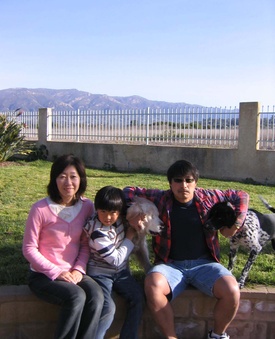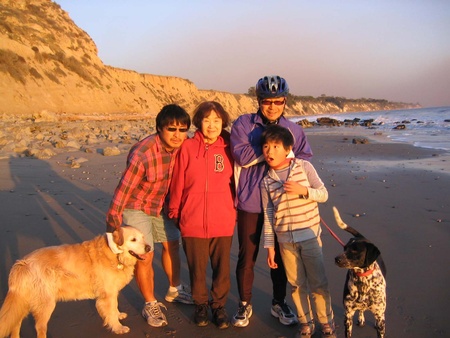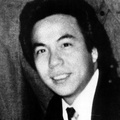I remember well when I first went to Japan in the '90s and how that changed how I regarded myself as a Canadian of Japanese descent. In a way, when you went to California you were returning to a culture that you were already well familiar with. Did your sense of yourself change in any way when you were in California? What was your wife Junko's experience like?
JT: Twelve years since my return to Japan, my wife, Junko, then relatively newly wed, moved to Santa Barbara for a two year stay at University California. Just before we were to depart, we saw on the news two Japanese students were shot in the head execution style, having their Honda Civic carjacked in San Pedro, the port of Los Angeles. That tore our California dreaming to shreds.
The second day after getting off the boat (actually a plane), I went to a sporting goods store to buy me a .22. I found out that you need to be a permanent resident to be able to have a gun, so I went home empty handed, to Junko’s delight. The third day, I bought a Chevy, not a Honda, knowing that Chevy’s are a good carjack repellent. And they were, since no thug ever gave my car any looks.
Santa Barbara was awesome. The size of the city was same as the Soo, but of course, the weather was always nice, the beaches were more sophisticated than those of Lake Superior (but the water is a cesspool), and it felt somehow safer, perhaps due to it being a city for the rich, and not a factory town.
Being Asian did not mean anything there. People don’t stare at you as if you are some kind of freak. They even ask you for directions, something nobody would bother to a speaky-no-Englishy in Northern Ontario. I even dug it better than Japan. This was the place I was looking for all my life.
I soon became part of the Asian community on campus, hanging out with Asian-American staff and faculty. They got a kick out of my rude, crude and lewd demeanor, cussing like a redneck bushwhacker, yet I was full blooded nihonjn. That’s what is missing when I am in Japan: to shoot the sh_t with my bros, dropping F bombs. It’s important for me to come out of my polite, reserved, majime Japanese shell, to be my Soo self at times so as to maintain my sanity.
At the same time, I was also looked upon as the spokesperson amongst the Japanese community, since I was proficient in English, and was a resource person for anyone seeking info about Americans and their life. It was at this phase in my life that I really felt my bicultural identity. I was part of both communities, American, and Japanese, and I can switch from one to the other without even knowing.
Junko took a liking to life in SoCal right away. Unlike my mom, she did not the least bit get homesick, and she actually felt pretty down during our last days there. She got her driver’s license in one shot, thanks to the availability of written test in Japanese, and was making good use of our Chevy. She spent her days visiting the University’s international centre where she took English classes, and after class, she would be playing tennis with her classmates, most of them visiting scholars from Japan.
Junko hung out with my American friends too. She was never shy to try out her English skills with them. We would invite each other for dinner frequently, visiting their houses, which seldom happens in Japan, and we would go on excursions to the outlet malls, or whale-watching, or just simply dinner at a fancy local restaurant.
Speaking of restaurants, this being Santa Barbara, the odd time we would run into a celebrity, like Michael Douglas, and a dude from the rock band Toad the Wet Sprocket. With the latter, I was wondering what a grungy, smelly looking hippie was doing at this upscale Montecito (where Prince Harry lives now) restaurant, not knowing who he was, until one of my friends told me. Toad—great local band, and I applaud them for looking like ordinary blokes, not millionaires that they actually are.
You're born in Japan, you grew up in Canada until the end of university, how were you identifying yourself back then? Of course, "Nikkei" wasn't a term that most of us even knew about back in the '90s.
JT: My brief stay during summer holidays in Nagoya, along with the Vincent Chin incident really changed my identity. After spending so many years in Canada, growing up as a Canadian kid, and feeling absolutely natural being part of its society, my return to Japan made me realize I was more Japanese than Canadian. I don’t know what it was, since my Japanese language ability was limited to speaking with no writing and reading, but I felt this strong sense of belonging in Japan, more than in Canada.
Maybe it could have been the anti-Japanese sentiment going around at that time that lead to an air of threat while I was in Windsor. Seemed that just the fact that I was Japanese brought out the hostility in folks. Of course, I had nothing to do with the dumping of Japanese goods onto Canadian shores, but they had to take it out on somebody. I am sure my WWII age senpai had it much worse upon Pearl Harbor. Whatever Japan does to piss the world off, it’s all on us Nikkei.
Right now, I’m sure my Nikkei brothers and sisters are feeling the backlash for our Fukushima plant dumping all that “radiated” water into the Pacific Ocean. Our politicians say it’s perfectly safe, but I don’t see any of them arrogant, corrupt, fat, bald bastards drinking it. Come to think of it, is Pickering OK? Never know what’s in Lake Ontario dude. Best stay away from the sushi made out of local bass.
In Japan, I am totally Japanese, forgetting all about my Canadian upbringing. It took decades for that to happen though, and I did go through lots of identity conflict. While a college kid in Tokyo, I thought dealing with Japanese folks was a huge pain in the ass, with complex, implicit rules to be followed—highly inefficient, and if you are an outsider, very confusing.
Later on, I would learn that was due to Japan being a high context culture (recommended reading: Edward Hall’s Beyond Culture, 1975), and Canada being low context. After 40 years in Japan, now I am all on top of their (our) under the table, behind your back stuff, and I have mastery of the art of Japanese beating around the bush.
But still, I think yelling at your neighbour, “Turn that (expletive) music down you (expletive) moron!” is much more straightforward, sincere, and efficient than:
“I love Metallica too. And you have such a nice stereo. Your JVC speakers are especially outstanding, as I can feel the walls of my room shake. That’s so awesome, listening to music with not just your ears but your whole body. You must be such an ardent fan to be listening to them even at this late hour. Sorry for bothering you so late at night when most people are sleeping. Please go back to enjoying your music.”
Interestingly, when I get off the plane at any North American airport, I instantly become Canadian.
First thing I do is ask the customs inspector, “Nice shirt bud. Where’d you get it?” When I get to my rent-a-car, I complain about my car assignment, that it’s a Chevy and not a Toyota. In my car, I crank up 102.1 on the dial (the famous Edge), and sing along to the Japandroids, until I’m on the 401, when the cussing storm starts. You are damn right the window is open when I curse the idiot out who is trying to butt in front of me at a lane merger. I’d rather have a dent on my car than let this bastard squeeze in (it’s a rental car anyway). Two hours of sitting in vintage Toronto traffic, I finally get off Kennedy Rd. to head to my Marriott, but before I do, I drive up to a Harvey’s, to fetch me a double cheese Angus and a diet Coke, and of course, poutine.
How Canadian is that, eh?
Do you know how many kikokushijo there are in Japan? Are there academics like yourself who keep in touch?
JT: They number around 11,000 at any year, according to Monbusho (Ministry of Education) stats. Back in the early 80’s, there were around 6.000, most of them elementary or middle school aged. Reason for this is that parents don’t dare take their high school kid overseas when they are facing strict admissions exams to Japanese universities within the next couple years. There is only one national standard admissions exam administered in January when you are a high school senior, and if you screw up, you sit at home for a year studying for your next crack at it.
I was actually not a kikokushijo per se, since I had already been a university student and it was a transfer. The term kikokushijo (帰国子女) connotates a girl and child, because parents opt out of taking their sons with them on an overseas assignment for the sake of keeping them competitive in university exams. I just searched the net for the actual gender breakdown, but cleverly, government stats avoid disclosing any evidence of the chauvinist ways of Japanese culture. At least when I was attending ICU, the ratio seemed around 80% women amongst kikokushijo. The guys would get high paying gigs upon graduation, but a lot of the girls went on to grad school overseas. I was the only man out of the same crop, who chose to go to grad school.
Over the years, I only know a handful of kikokushijo academics, and all of them are women. Kikokushijo are quickly grabbed by large corporations, so you’d be nuts not to take their offer, instead going to grad school to be in the poor house for life. I actually have a young prof as a co-worker, who grew up in North Carolina. She speaks perfect English, and we are counting on her to produce a lot of high impact publications, since she can write journal articles in English.
To be continued ... >>
© 2023 Norm Ibuki







